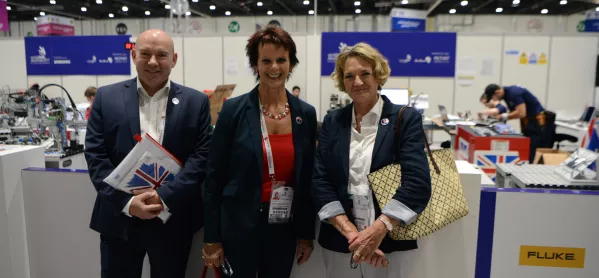- Home
- ‘We have something amazing,’ says WorldSkills UK chief
‘We have something amazing,’ says WorldSkills UK chief

The chief executive of the body responsible for skills competitions in the UK is optimistic about its future, following an impressive medal haul at last week’s WorldSkills competition in Abu Dhabi.
After Team UK managed to secure seven medals and 13 Medallions of Excellence, Neil Bentley, of WorldSkills UK (pictured, with Anne Milton, centre), said he was “much more optimistic” than after the EuroSkills competitions in Gothenburg last December.
Only days after the team UK’s return from Sweden, Tes had reported concerns that the organisation was at a “tipping point”, following cuts to its core funding from government. Figures obtained by Tes showed that core government grants for WorldSkills UK had dropped by almost half over four years, from £15 million in 2012-13 to £8.1 million in 2016-17.
But chief executive Mr Bentley told Tes that he was now significantly more optimistic about the future of WorldSkills UK than he had been a year ago. “I am a lot more optimistic. We have something really amazing here. We need to sell it differently and we need to think about how we can capitalise on the assets of what we have got. When you get the prime minister talking about skills, we can be an inspirational delivery tool for them.”
Focus on skills
He added that the visit of skills minister Anne Milton to Abu Dhabi to support Team UK had been further confirmation of the government’s focus on the skills agenda - and the role WorldSkills UK could play in that, particularly around careers policy, T levels and apprenticeships.
WorldSkills UK, formerly known as Find a Future, runs regional and national skills competitions, including the annual Skills Show, due to take place next month. It supports UK participants taking part in the biennial EuroSkills and WorldSkills contests and also conducts research and operates role-model schemes and careers events.
Last month, WorldSkills UK’s Rewind report confirmed that the organisation’s grant from the government had reduced by 13 per cent between 2015-16 and 2016-17 alone. However, alongside that, the organisation also made £2.1 million in efficiency savings in 2016-17.
Review of cost base
Mr Bentley said a review of the cost base had been on the agenda since he took up his post around two years ago, and had been necessary in the context of more austere education budgets. This had involved looking at how the Skills Show - the national skills competition and showcase - worked operationally, and making cuts where they did not affect the visitor experience. Italso included a reduction in staff costs. “When I started two years ago, we had about 50 team members, and we took it down to about 30,” he explained, adding that training for the team heading to international competitions had also had to be “much more cost-effective and targeted”.
Part of the strategy, he explained, was to diversify income. This would include attracting funding from trusts and foundations to support the development of commercial products. Developing a digital offer to complement the skills show, and involving past champions, was also part of the new five-year plan, said Mr Bentley. “We have had to be very clear on the direction of travel on where we want WSUK to be. We want to make sure we are having the right influence onyoung people and the apprenticeships and skills agenda.”
Government funding, which currently makes up the majority of WorldSkills UK’s funding, remained important, he stressed.
Want to keep up with the latest education news and opinion? Follow Tes FE News on Twitter, like us on Facebook and follow us on LinkedIn
Register with Tes and you can read two free articles every month plus you'll have access to our range of award-winning newsletters.
Keep reading with our special offer!
You’ve reached your limit of free articles this month.
- Unlimited access to all Tes magazine content
- Save your favourite articles and gift them to your colleagues
- Exclusive subscriber-only stories
- Over 200,000 archived articles
- Unlimited access to all Tes magazine content
- Save your favourite articles and gift them to your colleagues
- Exclusive subscriber-only stories
- Over 200,000 archived articles



